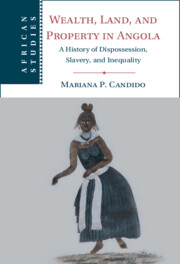Book contents
- Wealth, Land, and Property in Angola
- African Studies Series
- Wealth, Land, and Property in Angola
- Copyright page
- Contents
- Maps and Plans
- Illustrations
- Tables and Graphs
- Acknowledgments
- A Note on Currency and Price-Level Adjustments
- Introduction
- 1 Who Owned What?
- 2 Property Rights in the Nineteenth Century
- 3 Written Records and Gendered Strategies to Secure Property
- 4 Commodification of Human Beings
- 5 Branded in Freedom
- 6 The Erasure of Communal Rights
- 7 Global Consumers: West Central Africans and the Accumulation of Things
- Conclusion
- Bibliography
- Index
- African Studies Series
Introduction
A History of Ownership, Dispossession, and Inequality
Published online by Cambridge University Press: 22 September 2022
- Wealth, Land, and Property in Angola
- African Studies Series
- Wealth, Land, and Property in Angola
- Copyright page
- Contents
- Maps and Plans
- Illustrations
- Tables and Graphs
- Acknowledgments
- A Note on Currency and Price-Level Adjustments
- Introduction
- 1 Who Owned What?
- 2 Property Rights in the Nineteenth Century
- 3 Written Records and Gendered Strategies to Secure Property
- 4 Commodification of Human Beings
- 5 Branded in Freedom
- 6 The Erasure of Communal Rights
- 7 Global Consumers: West Central Africans and the Accumulation of Things
- Conclusion
- Bibliography
- Index
- African Studies Series
Summary
Regimes of property, whether held by African rulers or European administrators, were not transhistorical or total. The written regime of property in Angola emerged in specific contexts, articulated with imperialism, expansion of capitalism, and consolidation of the liberal notion of individual rights at the expense of collective ones. While Portuguese agents enforced a single model of property rights, local chiefs contested this model. Colonial property regimes altered the social order and allowed women, formerly enslaved people, and immigrants, often marginalized groups, to enjoy rights and subvert the economic and social order. The violence that exiled occupants from their own land also justified kidnapping and enslavement. This violence is almost erased in the colonial archives and scholarship that traces a linear progress from slave trade to legitimate trade and imperialism. Nonetheless, violence and appropriation pervade the histories of slavery, property, rights, consumption, and claims.
- Type
- Chapter
- Information
- Wealth, Land, and Property in AngolaA History of Dispossession, Slavery, and Inequality, pp. 1 - 34Publisher: Cambridge University PressPrint publication year: 2022

